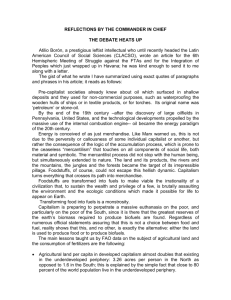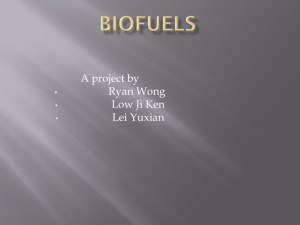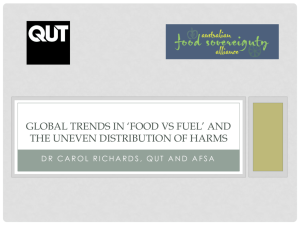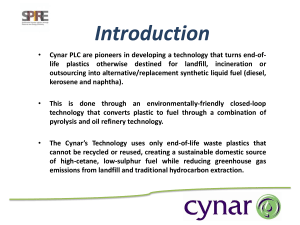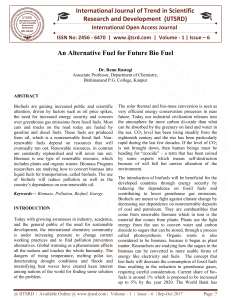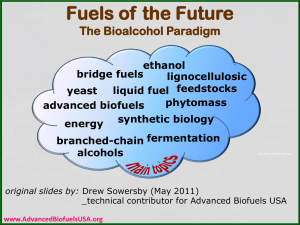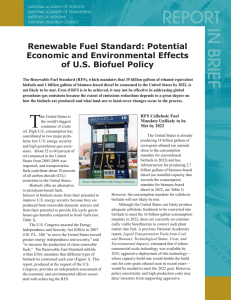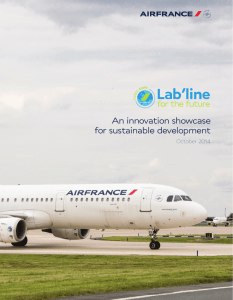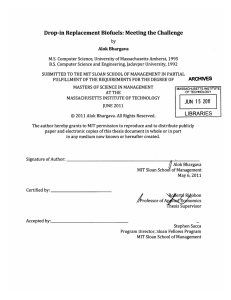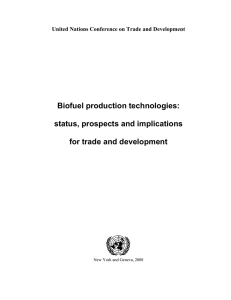PPTX - Governors' Biofuels Coalition
advertisement
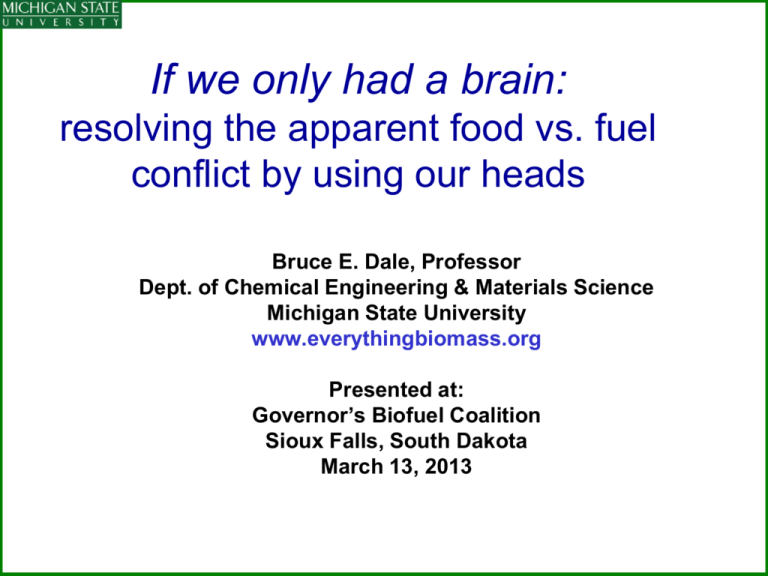
If we only had a brain: resolving the apparent food vs. fuel conflict by using our heads Bruce E. Dale, Professor Dept. of Chemical Engineering & Materials Science Michigan State University www.everythingbiomass.org Presented at: Governor’s Biofuel Coalition Sioux Falls, South Dakota March 13, 2013 Biofuels: A crime against humanity? • “[I]t's a crime against humanity to convert agricultural productive soil into soil... which will be burned into biofuel.” – Jean Ziegler, UN Special Rapporteur, 2007 2 Essay On The Principle of Population Thomas Robert Malthus 1766 - 1834 “The power of population is so superior to the power of the earth to produce subsistence for man, that premature death must in some shape or other visit the human race…” Energy Consumption, Human Health & Well Being are Linked Power Consumption and GDP (World Regions) Declining Oil Use & Declining Income? • US oil consumption peaked in 2007 at 20.7 million barrels/day • Oil consumption was ~18.9 million barrels/day in 2011– down 8.7% • Since 2007 median US household annual income has declined 8.2% (from $55,000 to $50,500) • Are people using less oil because they are poorer, or are they poorer because highpriced oil is killing jobs and economic growth? Commodity Prices Relationship between Commodity Prices: Oil -> Fertilizer -> Food Some Basic Energy Facts: Why Liquid Fuels are So Important • Services we need from energy (current primary sources of these services) – Heat (natural gas, coal) – Light/electricity (coal, natural gas, hydro/nuclear) – Mobility (liquid fuels from oil—96%, some ethanol & CNG)- most commerce • All energy services (all BTU, ergs, GJ) are not created equal— we value mobility (=oil) above all other energy carriers • Electricity/batteries can never provide more than about half of mobility needs—and they cannot support commerce at all • Commerce moves by trucks, ocean shipping, rail & jet aircraft • Oil is the “super commodity”---it is the only commodity that is required to produce and then transport every other commodity • Liquid fuels: not “energy” is the key economic security issue—and right now liquid fuels means refined oil products • The only potentially sustainable, very large scale source of renewable liquid fuels is sustainable plant matter— or “biofuels” 10 Crude Oil Prices from 1861 to 2010 Comparative Value of U.S. Energy Sources over Time Energy Consumption & Human Well Being are Linked: NO Countries have Both High HDI and Low Energy Use Renewable Energy is Critical for Human Well Being 1. Rate of energy use (power consumed) strongly affects (determines?) national wealth and human development 2. All rich societies use a lot of energy (~33% oil) 3. “Energy efficiency” helps but is not an answer in itself 4. Fossil energy use makes us rich today—what energy sources will make our grandkids rich? 5. How will the billions of poor people in the world ever access enough fossil energy to develop their potential? 6. Of all forms of energy, liquid fuels are the most valuable and most problematic in terms of supply, price and price volatility 7. Peak oil has already arrived- 2005 by my rear view mirror 8. Only large scale, low cost, low carbon energy sources can reduce GHGs, provide energy security and long term wealth 9. Sustainable biofuels are not optional—we must have them 10. How can we develop sustainable biofuel pathways? 14 Worldwide Crude Oil Production – Subdivided into World Regions and Top 10 Producers in 2010 Peak Oil If we only had a brain: resolving the apparent food vs. fuel conflict by using our heads Agriculture and Biofuels: we are not asking the right questions • We are asking: Can we impose a very large new demand for biofuels on the existing agricultural system without creating problems? • We should be asking: Can we redesign US agriculture to produce biofuels, food/feed & environmental services? • Would you enter the Indy 500 race driving a golf cart? • Would you use a toothbrush to sweep the floor? • Agriculture has changed before; it can change again • Examine actual land uses: most land is used for animal feed • One solution: think about the whole system and use land efficient animal feeds to boost total biomass output per acre 17 Land Efficient Animal Feeds Enable Large Environmental and Energy Benefits • • • • • • Most human use of land for agriculture is to produce animal feeds—not food directly By “redesigning” agricultural systems we can achieve large environmental and energy benefits—and reframe the debate in our favor by disarming our critics Use land more efficiently (and more sustainably) to produce more food, more feed, more fuel and large environmental services By producing more food/feed on existing land, we avoid the (truly silly) indirect land use change (iLUC) issue And, oh, by the way, we don’t “grow food”! (About 85% of our land used in agriculture is for animal feed) www.glbrc.org 19 Double Cropping • Grow crops (grasses) over winter & spring on corn or soy land while still growing corn/soy – Does NOT require new land – Increases sustainable corn stover harvest rate – Biomass be used for biofuels, animal feed, etc – Reframe the !#%+ “food vs. fuel” debate!! Holt, MI: May 5, 2005 20 Current vs Possible Land Use • Total biomass production increases by 2.5 fold on same land area – Displaces 50% of US gasoline & 5% of US electricity – Reduces US GHGs by over 10% & nitrate losses by 75% – Food & feed production remain the same- no iLUC 21 Some Thoughts on the Sustainability Transition • • • • • • We are in a time of profound transition in how the world will be fueled & fed– we cannot continue forever along our current pathways (oil & fossil fuel dependent), we must change & the sooner the better The changes required will be far reaching, profound, revolutionary, upsetting, painful, exciting…pick an adjective (how about “profitable”?) Liquid fuels from plant matter (biofuels) are an essential part of the sustainability transition—this will cause a huge impact on the economic, physical & social “landscapes” We should be seeking large, complementary, beneficial changes: we need food (feed) and fuel and better environmental performance and rural economic development and better social outcomes (win-win x 5) This will not happen by accident—we must envision (use our heads), and design (do the R&D) sustainable systems to achieve multiple objectives…then implement these systems This industry needs to reframe the debate by committing itself to produce more food, more fuel, more rural economic growth and better environmental performance…stop playing defense and play offense instead…time to win! “First they ignore me, then they ridicule me, then they attack me…then I win.” Mahatma Ghandi (thanks to Amy Schwab of NREL for the quote) A Personal Approach to Sustainability
